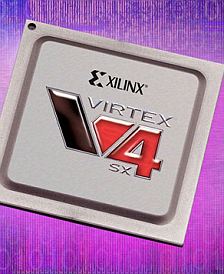Researchers Create CPU With 1,000 Cores
Does something like this even need Hyperthreading?
Think you're pretty cool there with your hexacore desktop processor? That's nothing. Researchers from the University of Glasgow have created a CPU that has 1,000 cores – that's right, one thousand cores on a single chip.
The scientists are using a Field Programmable Gate Array (FPGA) chip with 1,000 mini-circuits inside. The chip has some considerable bandwidth too, as it was able to process 5GB of data per second in testing. Each core has its own dedicated memory.
Dr. Wim Vanderbauwhede, the lead on the project, said, "FPGAs are not used within standard computers because they are fairly difficult to program but their processing power is huge while their energy consumption is very small because they are so much quicker - so they are also a greener option."
"This is very early proof-of-concept work where we're trying to demonstrate a convenient way to program FPGAs so that their potential to provide very fast processing power could be used much more widely in future computing and electronics," he added.
While it won't do anything to upset the current state of desktop computing, it's interesting research into the massively multicore future.
Read more at the DailyMail.
Get Tom's Hardware's best news and in-depth reviews, straight to your inbox.
-
nua2 I tought an FPGA had higher leak current compared to a Application specific IC.If they can fit 1000 in a FPGA probably they could fit 1500 in a ASIC...Reply
On http://opencores.org/project,or1k they have an opensource CPU for FPGA.
-
bluekoala alhanelemoverkill much?Not overkill at all. Just highly scalable. It's not because don't yet know what to do with it that it's too much. Plus if this chip ends up being really cheap with a low power consumption, you could have one in a smart phone and not have to upgrade for CPU power.Reply
I have 800 stream processors in my HD4850. It's a nice step forward to have 1000 CPU cores in a chip.
But what I'm really looking forward to is AMD's fusion cores ;)
-
spellbinder2050 Will today's software even utilize that much computing power?Reply
Also, what about bottlenecks? i.e. ram and disk. -
Horhe ReplyFPGAs are not used within standard computers because they are fairly difficult to program
You can say that again! It took me a week to make one to display some text on a LCD screen (it was the first time I programmed a FPGA).
I knew that FPGAs are very flexible, but I never knew that they are so powerful.

